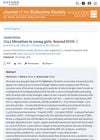 March 2020 in “Journal of the turkish academy of dermatology”
March 2020 in “Journal of the turkish academy of dermatology” There's no significant link between blood fat levels and male pattern baldness.
 January 2018 in “Przegla̧d dermatologiczny”
January 2018 in “Przegla̧d dermatologiczny” Hair loss may increase heart disease risk.
 May 2023 in “Journal of Cosmetic Dermatology”
May 2023 in “Journal of Cosmetic Dermatology” Being overweight can cause or worsen skin problems in children, some more common in darker skin, and is often linked to insulin resistance.
 October 2024 in “Journal of the Endocrine Society”
October 2024 in “Journal of the Endocrine Society” Hirsutism in young girls can have various causes beyond PCOS, so diagnoses should be reconsidered if treatments don't work.
13 citations,
March 2012 in “The American Journal of Surgery” Modified laparoscopic sleeve gastrectomy effectively controls diabetes and treats obesity with minimal complications.
 January 2017 in “Open Journal of Endocrine and Metabolic Diseases”
January 2017 in “Open Journal of Endocrine and Metabolic Diseases” The document concludes that managing Dunnigan-Type Familial Partial Lipodystrophy involves treating associated health issues and using medications like metformin and leptin replacement.

The conclusion is that there's a link between high testosterone levels, insulin resistance, and certain skin conditions, regardless of obesity.
 40 citations,
November 2019 in “Frontiers in Endocrinology”
40 citations,
November 2019 in “Frontiers in Endocrinology” Metabolic Syndrome is linked to several skin conditions, and stem cell therapy might help treat them.
 37 citations,
October 2021 in “Nutrients”
37 citations,
October 2021 in “Nutrients” Vitamin D might help regulate insulin in the body, but taking Vitamin D supplements doesn't clearly prevent or improve type 2 diabetes. More research is needed.
16 citations,
January 2016 in “Indian Journal of Dermatology, Venereology and Leprology” Metabolic syndrome is more common in people with early-onset androgenic alopecia.
 7 citations,
August 2023 in “EClinicalMedicine”
7 citations,
August 2023 in “EClinicalMedicine” Anti-androgens can help manage some PCOS symptoms better than metformin but are not more effective than placebos or birth control pills for other symptoms.
 November 2022 in “The Journal of Clinical Endocrinology and Metabolism”
November 2022 in “The Journal of Clinical Endocrinology and Metabolism” Postmenopausal hyperandrogenism, a condition with symptoms like increased hair growth and acne, is usually caused by PCOS but can also be due to other factors. It's diagnosed by checking testosterone levels and treated either by removing the adrenal tumor or through antiandrogen therapy.
January 2022 in “Dubai diabetes and endocrinology journal/Dubai diabetes & endocrinology journal” A 16-year-old girl with HAIR-AN syndrome was treated with lifestyle changes and medications to manage her condition.
 January 2022 in “Surgical and Cosmetic Dermatology”
January 2022 in “Surgical and Cosmetic Dermatology” People with androgenic alopecia (AGA) have a higher chance of getting metabolic syndrome.
306 citations,
August 2011 in “Journal of cachexia, sarcopenia and muscle” Enobosarm significantly increased muscle mass and improved physical function in elderly men and postmenopausal women without serious side effects.
105 citations,
March 2006 in “Human reproduction” Metformin improves quality of life, emotional health, and sex life in women with polycystic ovary syndrome.
 68 citations,
January 2022 in “International Journal of Molecular Sciences”
68 citations,
January 2022 in “International Journal of Molecular Sciences” PCOS management includes lifestyle changes and medications, with ongoing research into repurposed drugs for better treatment options.
 30 citations,
January 2023 in “EFSA journal”
30 citations,
January 2023 in “EFSA journal” Adults should not consume more than 255 micrograms of selenium per day to avoid risk of hair loss and other side effects.
 28 citations,
January 2017 in “Indian Dermatology Online Journal”
28 citations,
January 2017 in “Indian Dermatology Online Journal” Skin problems like acne, excessive hair growth, and oily skin are common in women with PCOS and can help with early diagnosis.
24 citations,
April 2008 in “Fertility and sterility” Pioglitazone improved insulin sensitivity and altered cortisol metabolism in PCOS patients.
 14 citations,
August 2019 in “BioMed Research International”
14 citations,
August 2019 in “BioMed Research International” Belly fat is the main predictor of nonalcoholic fatty liver disease in both women with Polycystic ovary syndrome and healthy women.
10 citations,
January 2019 in “Indian Journal of Dermatology” Early-onset male hair loss is linked to metabolic syndrome, suggesting a need for heart health monitoring and lifestyle changes.
 9 citations,
March 2022 in “Journal of the Endocrine Society”
9 citations,
March 2022 in “Journal of the Endocrine Society” Girls with PCOS have higher levels of certain androgens, which are linked to excess hair growth, but these androgens don't help diagnose PCOS.
6 citations,
September 2023 in “International journal of molecular sciences” Oxidative stress worsens PCOS by damaging cells and disrupting metabolism, suggesting antioxidant treatments might help.
 6 citations,
December 2022 in “International Journal of Molecular Sciences”
6 citations,
December 2022 in “International Journal of Molecular Sciences” Hormone imbalance is linked to Hidradenitis Suppurativa, a skin condition, and treatments like anti-androgenic therapy and metformin can help. It's also suggested to check patients for insulin resistance and Polycystic Ovary Syndrome.
6 citations,
December 2021 in “International Journal of Endocrinology” The genetic variant studied does not affect PCOS symptoms in Kashmiri women.
 4 citations,
May 2024 in “The Lancet”
4 citations,
May 2024 in “The Lancet” Bariatric surgery improves ovulation rates in women with PCOS and obesity better than medical therapy.
 3 citations,
May 2023 in “Biomedicines”
3 citations,
May 2023 in “Biomedicines” PCOS causes infertility mainly due to hormonal imbalances, insulin resistance, and chronic inflammation.
3 citations,
January 2022 in “Anais Brasileiros De Dermatologia” Androgenetic alopecia in teens is linked to obesity and other metabolic risks, needing early diagnosis and management.
 3 citations,
September 2021 in “International Journal of Molecular Sciences”
3 citations,
September 2021 in “International Journal of Molecular Sciences” Androgens and a high-fat diet may increase the risk of severe COVID-19 in women with PCOS by upregulating certain proteins in the heart and kidneys.




















